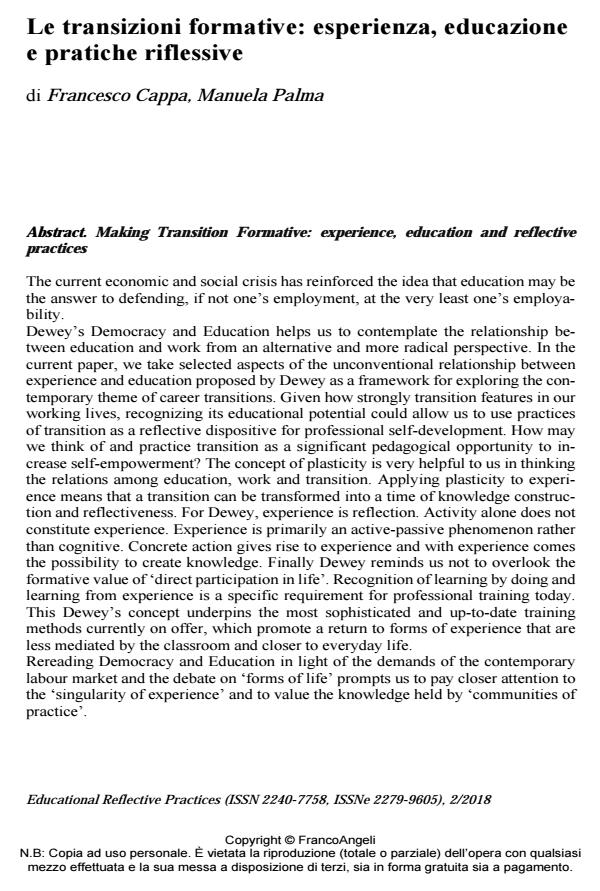Making Transition Formative: experience, education and reflective practices
Journal title EDUCATIONAL REFLECTIVE PRACTICES
Author/s Francesco Cappa, Manuela Palma
Publishing Year 2019 Issue 2018/2
Language Italian Pages 17 P. 108-124 File size 220 KB
DOI 10.3280/ERP2018-002008
DOI is like a bar code for intellectual property: to have more infomation
click here
Below, you can see the article first page
If you want to buy this article in PDF format, you can do it, following the instructions to buy download credits

FrancoAngeli is member of Publishers International Linking Association, Inc (PILA), a not-for-profit association which run the CrossRef service enabling links to and from online scholarly content.
The current economic and social crisis has reinforced the idea that education may be the answer to defending, if not one’s employment, at the very least one’s em-ployability. Dewey’s Democracy and Education helps us to contemplate the relationship be-tween education and work from an alternative and more radical perspective. In the current paper, we take selected aspects of the unconventional relationship between experience and education proposed by Dewey as a framework for exploring the contemporary theme of career transitions. Given how strongly transition features in our working lives, recognizing its educational potential could allow us to use practices of transition as a reflective dispositive for professional self-development. How may we think of and practice transition as a significant pedagogical opportunity to increase self-empowerment? The concept of plasticity is very helpful to us in thinking the relations among education, work and transition. Applying plasticity to experience means that a transition can be transformed into a time of knowledge construction and reflectiveness. For Dewey, experience is reflection. Activity alone does not constitute experience. Experience is primarily an active-passive phenomenon rather than cognitive. Concrete action gives rise to experience and with experience comes the possibility to create knowledge. Finally Dewey reminds us not to overlook the formative value of ‘direct participation in life’. Recognition of learning by doing and learning from experience is a specific requirement for professional training today. This Dewey’s concept underpins the most sophisticated and up-to-date training methods currently on offer, which promote a return to forms of experience that are less mediated by the classroom and closer to everyday life. Rereading Democracy and Education in light of the demands of the contemporary labour market and the debate on ‘forms of life’ prompts us to pay closer attention to the ‘singularity of experience’ and to value the knowledge held by ‘communities of practice’
Francesco Cappa, Manuela Palma, Le transizioni formative: esperienza, educazione e pratiche riflessive in "EDUCATIONAL REFLECTIVE PRACTICES" 2/2018, pp 108-124, DOI: 10.3280/ERP2018-002008